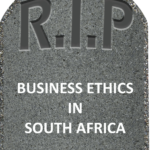Business ethics are dead
Business Ethics are dead!
Doing the wrong thing for the right reason
 Business ethics are dead – a thing of the past. We will teach our children about this oxymoron called “Business Ethics”. They will hang onto our lips, amazed at this foreign concept that is long forgotten.
Business ethics are dead – a thing of the past. We will teach our children about this oxymoron called “Business Ethics”. They will hang onto our lips, amazed at this foreign concept that is long forgotten.
Case Study: You are the CEO of a South African company. You have won a tender with a business based in West Africa to the value of $10m. The buyer of the customer contacts you and tells you that the contract will be finalised as soon as you pay $100k into his personal account (taking bribes are acceptable in this country). If you lose this tender, you have to retrench 500 of your workers.
What will YOU do? Will YOU pay the bribe or not?
I have posed this fictional case study to thousands of students and executive staff, over the years. Always with the same result.
There are four questions you should ask yourself whenever you are faced with an ethical dilemma.
- Is it legal? In other words, will you be violating any laws, regulations or company policies by engaging in this activity?
- Is it balanced? Is it fair to all parties concerned both in the short-term as well as the long-term? Is this a win-win situation for those directly as well as indirectly involved?
- Is it right / fair? Most of us know the difference between right and wrong, but when push comes to shove, how does this decision make you feel about yourself?
- Do I mind others knowing what I have decided? (Transparency) If you are shy about doing something and would not like others to know about it, it is probably unethical.
In most of the cases, when dealing with “grey decisions”, just one of these questions is not enough. But by taking the time to reflect on all four, you will often find that the answer becomes very clear.
More than 87% of the people I have asked what decision they will make (to pay the “bribe” or not), said that they will definitely pay the $100k to secure the tender. In doing so, they have ensured that 500 people are not put on the street. And if you consider that these 500 people support 4 people or more each, they have in fact guaranteed that 2 000+ people are cared for. Can we fault this? Have they not made the RIGHT decision?
Two years down the line, the same companies are again in a similar situation. Now the contract value is $20m and the “bribe” is $1m. But the catch this time is, if the CEO does not pay it again, the buyer will expose his previous action of paying the first bribe. The buyer is in a country where bribery is acceptable, whilst the CEO is in SA. Bribery in business, and politics, is rife in South Africa today. Surely then it is acceptable? “Everybody does it” – I hear you say. “I cannot do business in SA without paying commissions (or finder’s fees)” “My first responsibility is to grow my business and be able to pay my staff”. “I will do anything to achieve my targets”.
With all the corruption taking place, where high profile people are implicated, seemingly without dire consequences – we can make a great case for stating that “Business Ethics are dead”. We have been de-sensitised. We can easily put a spin on any decision: We are making “wrong” decisions for the right reasons.
“So we must think through what management should be accountable for; and how and through whom its accountability can be discharged. The stockholders’ [and stakeholders’] interest, both short and long-term, is one of the areas. But it is only one”. [Peter Drucker]
What do you think? Are ethics in business dead? Can we still resurrect it, or should we just give up and carry on with our unethical lives?
Prof Gary advises executive management on methods to turn their companies around and how to increase net profit. He critically analyses a company, recommended strategies and help with implementation through interim management. He developed a course and business tools to help industry leaders to disrupt their industries through innovation (Disrupt and Grow).
